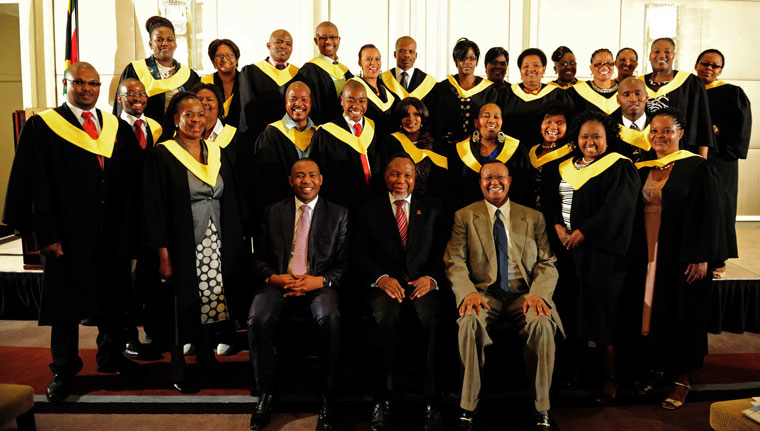By: Linda Nordling
Send to a friend
The details you provide on this page will not be used to send unsolicited email, and will not be sold to a 3rd party. See privacy policy.
Four African universities have been recently ranked globally, but does it matter? Linda Nordling explains.
Global university rankings often draw passionate debates among academics. African opinion makers have argued that such rankings are based on criteria that matter little to the continent’s universities, and that African academics should therefore ignore them.
This view is fuelled by the lack of Sub-Saharan Africa universities in these rankings. It is a fair point. Unless your university is South African, chances are it doesn’t appear in the Times Higher Education (THE), Shanghai Jiaotong or Quacquarelli Symonds (QS) rankings, all of which are produced annually by companies in China and the United Kingdom. These rankings measure factors such as performance, the ratio of staff to students and international linkages.
However, this is set to change. The latest QS rankings, published last month (16 September), had four African newcomers: the University of Ghana, the University of Nairobi (Kenya), the Makerere University (Uganda) and the University of Dar es Salaam (Tanzania).
“Institutions around the world are increasingly [getting] interested in Africa and asking us about institutions they might look to partner with.”
Ben Sowter, QS intelligence unit
The four appeared towards the end of the 800 universities that were ranked. Nevertheless, it should be seen as a feather in the cap of these four universities. And it also bodes well for others on the continent that want to improve their research and teaching, and raise their international profile.
The lion wakes
Whether Africans like it or not, the world is getting interested in the continent’s universities. Ben Sowter, head of division, the QS intelligence unit, says his rankings actively work to include a more diverse range of institutions, including those from Africa.
“Institutions around the world are increasingly [getting] interested in Africa and asking us about institutions they might look to partner with. We felt it was high time, especially given the now extended range of our rankings, to begin to better understand that question,” he says.
QS says that its rankings are drawn from a 4,000 strong list of global universities. This list evolves all the time, and institutions are either included because they volunteer to be listed, or because QS picks them up in country surveys.
The 800 universities that finally appear in the QS World University Rankings are selected according to their performance in QS performance metrics. Half their scores are drawn from universities’ reputation based on global surveys. The rest comes from measures including article citations and staff-to-student ratios.
Sowter says five African universities in its long list were investigated closer for inclusion in the rankings this year, based on their performance in the reputation surveys. However, one of them — the University of Ibadan in Nigeria — did not have the requisite supporting data to give to QS, which meant it didn’t make the cut.
If Ibadan produces the goods, it may well be included next year, possibly alongside other African newcomers, says Sowter.
Why should Africa care?
Should African universities be interested in the attention being paid to them by international rankings? No, says Goolam Mohamedbhai, a Mauritian former secretary-general of the Association of African Universities. Half of the QS rankings scores are based on qualitative data from reputation surveys, and say nothing about the actual performance of institutions, he says.
“I maintain that international rankings using the current criteria are of little use to African universities, and they should keep away from them,” Mohamedbhai says.
But I can think of two reasons having more internationally ranked African institutions is good news for those that make the cut as well as the continent’s higher education sector as a whole.
Firstly, ranked universities are attractive to students and staff.
“I maintain that international rankings using the current criteria are of little use to African universities, and they should keep away from them.”
Goolam Mohamedbhai
In Africa, a QS-ranked university is likely to get more attention from students than non-ranked ones. At the moment, African academics flock to South Africa, where several institutions make the top rankings. Ranked universities elsewhere in Africa could help stem this brain drain.
Secondly, universities can use rankings to analyse their strengths and their weaknesses. Even if international rankings do not capture all the elements that make for a successful university in Africa — for instance, there are no points for community engagement — they can nevertheless check their performance on other key academic pursuits, including teaching, research and international engagement.
Ranking good for Africa
There are new types of rankings, some of which say they judge developing country institutions more sensitively.
Earlier this year, both THE and QS published so-called “BRICS” university rankings, focusing on universities in fast-growing economies such as Brazil, China, India and South Africa.
Meanwhile, the EU-funded U-Multirank says it uses broader measures of academic performance, including industry linkages.
None of these may serve African universities perfectly, nor judge them justly.
Nevertheless, I think the majority of Africa’s academics will be heartened to see their institution’s name in them, as well as in the more traditional global rankings. Not to pinpoint their place in the globalised higher education system, necessarily. But to prove that they are a part of it, not separated from it.
Journalist Linda Nordling, based in Cape Town, South Africa, specialises in African science policy, education and development. She was the founding editor of Research Africa and writes for SciDev.Net, Nature and others.














